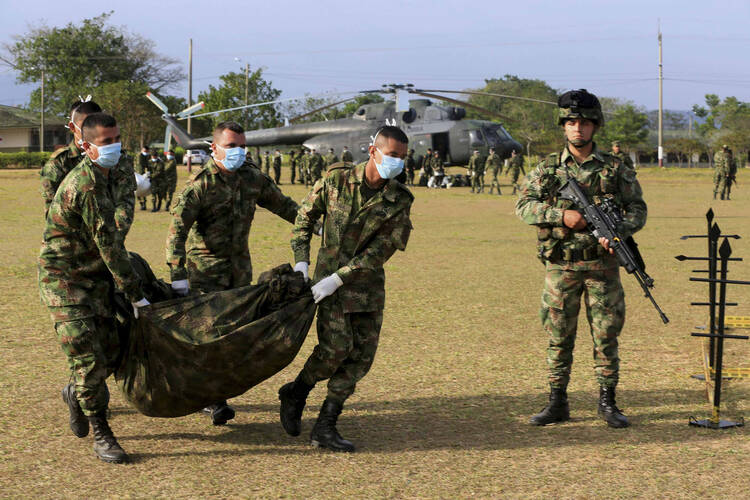The Vatican played a quiet but decisive role in bringing the United States and Cuba together, two nations that had been adversaries for decades but which now seem on a course toward a peaceful and mutually beneficial normalization of relations. Negotiators for Colombia’s FARC rebels (Spanish: Fuerzas Armadas Revolucionarias de Colombia) clearly took note of the pivotal role played by Pope Francis in that outcome. One suggested this week that the pope meet with FARC officials during his visit to Cuba in September.
There have been positive developments just this week in the long peace negotiations in Cuba between FARC and the Colombian government: FARC officials extended indefinitely a unilateral ceasefire declaration today, and Colombia’s Conflict Analysis Resource Center reports that the intensity of the civil war has dropped to its lowest lowest level in more than 40 years. But it would be wrong to believe that a successful conclusion to the negotiations is guaranteed. In recent months the peace talks have bogged down—they have been ongoing in Havana since 2012 but have consistently fallen shy of a final agreement. Worse, new clashes between Colombian troops and FARC forces have taken place in Colombia. After more significant outbreaks of violence in April and May, six clashes between the FARC and Colombian security forces have occurred over the past four weeks, leaving three army soldiers and three guerrillas dead.
Perhaps concerned about the possibility of a deeper breakdown, FARC peace negotiators made their appeal for a direct intervention from Pope Francis. Colombian Archbishop Luis Castro Quiroga told local media that he was hopeful such a “small meeting” in support of the peace process might be arranged. Though Vatican officials quickly dismissed the possibility, the archbishop said the gesture would be important to the FARC: “The decision lies with the Vatican. If it says the meeting is not on the Pope’s schedule, it is not on the Pope’s schedule. I still, however, hope for a brief meeting, a blessing for the process that is underway. A public statement, a blessing … this is what the FARC are hoping for.”
According to Archbishop Castro, Pope Francis has proposed that an observer from the Holy See attend the Havana negotiations. "This is the form in which Pope Francis can support the Colombian peace process,” he said, before adding that “the acceptance of this figure must have the consent of both parties, the Colombian government and the FARC.”
The appointment of a Vatican observer makes a good initial step but a more personal gesture, such as the meeting requested by FARC, may be warranted as negotiations enter this critical stage. Colombia’s civil war is now entering its fifth decade. While other crises have driven it from the headlines, the conflict has been devastating for the nation. Somewhere in the vicinity of 250,000—80 percent of whom were civilians—have died during the conflict and 5 million have been driven from their homes. It would be a historic tragedy if negotiations falter now so close to a comprehensive conclusion.
A meeting in Cuba, even one that is more symbolic than substantive, offers some risks for the pope, but his intervention—and blessing on the outcome of the peace process in Colombia—could be just the push negotiators need to finish the job and bring in an end to a conflict that has smoldered since 1964. Pope Francis has promised to visit Colombia once the negotiations are successfully concluded. He should reconsider FARC’s offer and see what he can do to help arrange that flight himself.








